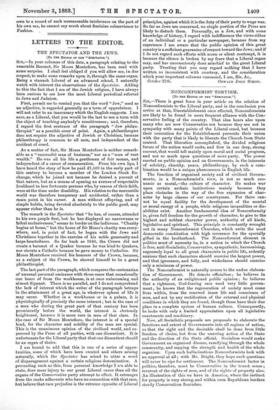LETTERS TO THE EDITOR.
THE SPECTATOR AND THE JEWS.
[To THE EDITOR or THE " sPurraToa.")
81.14—In your columns of this date, a paragraph relating to the venerable Baronet, Sir Moses Montefiore, has been read with some surprise. I shall feel obliged if you will allow me, in due respect, to make some remarks upon it, through the same organ. Being a staunch Liberal of an advanced school, I naturally watch with interest the observations of the Spectator. Adding to this the fact that I am of the Jewish religion, I have always been curious to see how the most Liberal periodical referred to Jews and Judaism.
First, permit me to remind you that the word "Jew," used as an adjective, is regarded generally as a term of opprobrium. I
will not refer to an inaccuracy which the English suggests. I am sure, as a Liberal, that you would be the last to use a term with the object of touching anybody's sensitiveness ; and, therefore, I regard the first sentence of the paragraph " Jew philan- thropist" as a possible error of print. Again, a philanthropist does not require the adjective of Jewish or Christian, because philanthropy is common to all men, and independent of the accident of creed.
As a matter of fact, Sir Moses Montefiore is neither remark-
able as a "successful man of business," nor as a "man of vast wealth." He was all his life a gentleman of fair means, and independent of a career of remuneration. From his own lips, I have heard the story of how he paid £1,500 in the early part of this century to become a member of the London Stock Ex- change, which he joined not because he desired a pursuit of that nature, but as a means of opening an avenue of respectable livelihood to less fortunate persons who, by reason of their faith, were at the time under disability. His relation to the mercantile world was therefore temporary and accidental, rather than a main point in his career. A man without offspring, and of simple habits, being devoted absolutely to the public good, may appear richer than he is.
The remark in the Spectator that "he has, of course, attended
to his own people first, but he has displayed no narrowness or tribal exclusiveness," seems to border on the ludicrous. "Charity begins at home," but the home of Sir Moses's charity was every- where, and, in point of fact, he began with the Jews and Christians together in the exercise of his noble generosity and large-hearted ness. So far back as 1840, the Crown did not create a baronet of a Quaker because he was kind to Quakers, nor elevate a Catholic because he gave money to Catholics. Sir Moses Montefiore received his honours of the Crown, because, as a subject of the Crown, he showed himself to be a great philanthropist.
The last part of the paragraph, which compares the centenarian of unusual personal eminence with those cases that occasionally 'one hears of from the workhouse, is at once unbecoming and almost flippant. There is no parallel, and I do not comprehend the lack of interest which the writer of the paragraph betrays in the attainment of a great age, in whatever sphere of life it may occur. Whether in a workhouse or in a palace, it is physiologically of precisely the same interest ; but in the case of a man who during the great part of that century has been prominently before the world, the interest is obviously heightened, because it is more rare in men of that class. In the case of Sir Moses Montefiore, the interest is of a special kind, for the character and nobility of the man are special. This is the unanimous opinion of the civilised world, and ex- pressed by the Press of all parties, with one dissentient. It is unfortunate for the Liberal party that that one dissentient should be an organ of theirs.
I am bound to add that this is one of a series of oppor- tunities, some of which have been created and others arising naturally, which the Spectator has seized to utter a word of disparagement against a certain religions denomination. A proceeding such as this, from personal knowledge I a-n able to -state, does more injury to our great Liberal cause than all the organs of the Conservative party attempt to effect. It estranges from the ranks adherents who have no connection with that race, but believe that race prejudice is the extreme opposite of Liberal
principles, against which it is the duty of their party to wage war. So far as Jews are concerned, no single portion of the Press are likely to disturb them. Personally, as a Jew, and with some knowledge of history, I regard with indifference the views either of an individual or a particular newspaper, because from my experience I am aware that the public opinion of this great country is a sufficient guarantee of respect toward the Jews; and if I do not regard such efforts with Scorn or silent contempt, it is because the silence is broken by my fears that a Liberal organ may, and has unconsciously done mischief to the great Liberal party. Trusting that you may regard nothing that I have written as inconsistent with courtesy, and the consideration which your important columns command, I am, Sir, &c.,






































 Previous page
Previous page